Doing the Opposite of Procrastination: Learn How to Cope With It Professionally
.jpg)
Table Of Contents
“You may delay, but time will not.”― Benjamin Franklin
How To Cope With Procrastination Professionally
In a world full of work and deadlines that should be managed, procrastination could be a huge problem that should be handled in a strategic way. In society, the attitude towards procrastination is a topic of discussion. This thief of time can make even the most trivial tasks hard to do.
It is seen as a problem, for sure, and it is usually associated with laziness, low self-efficacy, and lack of discipline. It might have a bad influence on your academic or business performance, however, in order to deal with the stress that procrastination causes, you can use it as a strategy for better time management. Therefore, you can use a productivity tool such as BeforeSunset to adapt this strategy easily to your life.
Here are the key points about handling the procrastination process: First, you should be aware of your problem; then, you should find the reason for it; and lastly you should find strategies for dealing with this problem. Before finding our strategies for handling this problem, we should comprehend what is procrastination first.
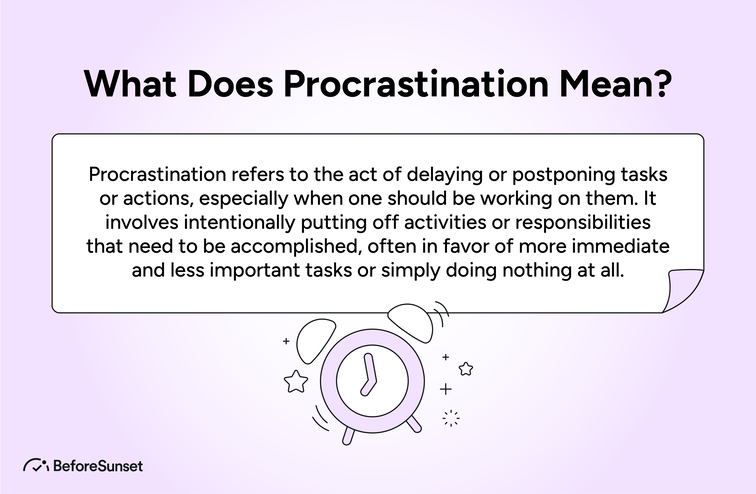
Procrastination Does Not Equal Laziness
First of all, you should recognize your enemy. Procrastination is basically the act of delaying or being slow about the tasks that should be done for a length of time. Even If they are unpleasant tasks or easy tasks you can procrastinate.
While you are procrastinating, you are usually distracted by other activities, such as checking your mobile phone, doing fun activities that could cause you to forget your pressure about the task, and so on.

Procrastinator means
Professor Clarry Lay calls procrastination a temporal gap between intended behavior and enacted behavior.' Actually, it is all about timing and prioritizing. You choose to spend time doing another activity in a significant time period, instead of doing the task that you should prioritize.
That decision might end up with missed deadlines, poor academic or business performance, or lower grades unless you decide to turn the tables on yourselves.
If you didn't understand procrastinator meaning
Let's make this clear with an example. If you have an assignment to submit in three days, which will actually take three hours, you can either choose to do it for three days or choose to do it in the last three hours. In the first option, you will spend three days doing your assignment.
In the second option, you won't have any time to mess around, and therefore, you will have to focus on your task. Through this decision, you can learn to manage your time efficiently. In order to cope with procrastination, we should know the reasons why we procrastinate.
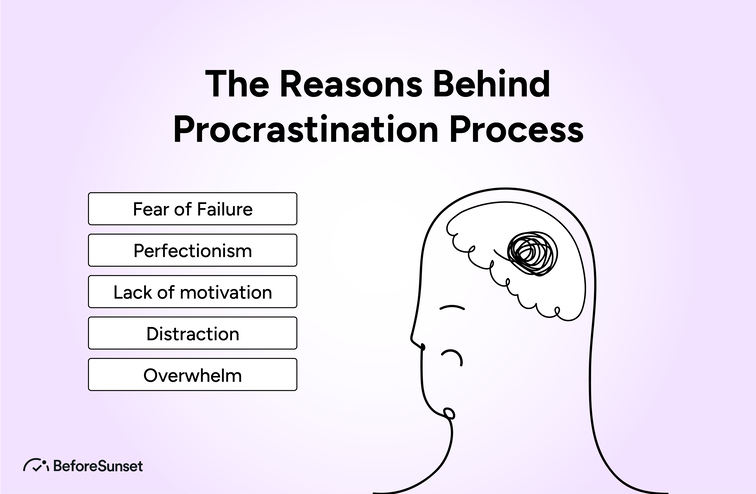
The Reasons Behind Procrastination Process
Why do we procrastinate or why do we delay? There are numerous studies about these questions. Instead of labeling this process with false facts, psychological aspects of the situation should be analyzed.
According to researchers, there are actually several reasons behind the act of delaying.
- You cannot decide where to start or what to choose as a topic, therefore you procrastinate inevitably. Uncertainty is one of the main reasons behind procrastinating. If you feel uncertain about the things related to your task, you’ll more likely to end up being a procrastinator.
- You’re unable to deal with the fear of failure when you have a task. Also, being a perfectionist might be related to this fear. You worry about the quality of the work which you haven’t even started or you are afraid of failure from the beginning.
- You will be more voluntary to do the tasks that you love and want. If you are not eager about the performance of your task, you will probably delay doing it. Hence, task aversion is another important factor that hinders you from doing your task on time.
Doing The Opposite of Procrastination
The reasons behind the procrastination cause you to feel overwhelmed with this whole process. In order to be more productive, you can take advantage of some tips and advice.
- Making a list can help you to stay on track. You can either write down your tasks in a notebook or you can create a to-do list through an online tool (Such as BeforeSunset AI)
- Prioritizing your responsibilities can help you to be organized. You can feel at ease by knowing your priorities and the ordering of the tasks.
- Using a time management tool can help you to stress less and increase your focus on the tasks.
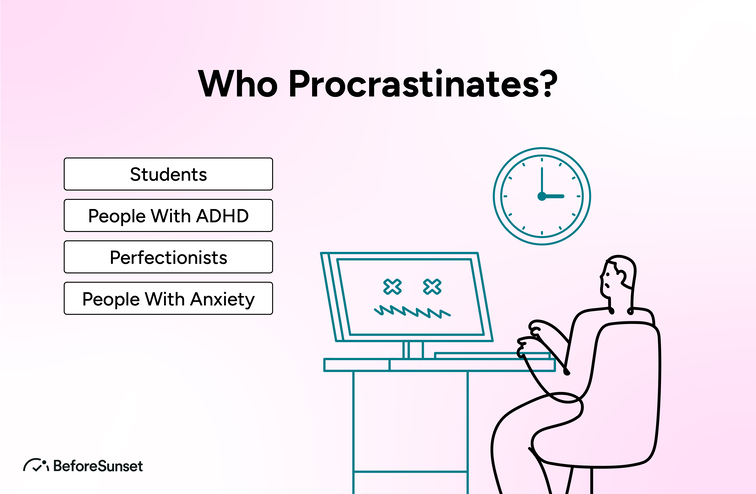
Who Procrastinates?
Indeed, it is all familiar to most people. Not only in the work field but also in our daily lives we procrastinate a lot. We say that we will start our diets on Mondays. We delay even household chores because we exaggerate things. Research has shown that there is no significant difference among the procrastinator profiles.
The term procrastination is the inability to do your tasks on time.
For example, we can't say that men are more prone to procrastinating or that students with lower grade point averages have a tendency to procrastinate. Both students and employees deal with procrastination. When studying, undergrad and grad school students have to deal with a lot of assignments, exams, and papers. That applies to employees as well.
They have a lot going on and sometimes their workload stresses them which might result in procrastination. The important point here is that you should embrace this whole process and create solutions to increase your productivity. You should manage your stress, your time, and your mind.
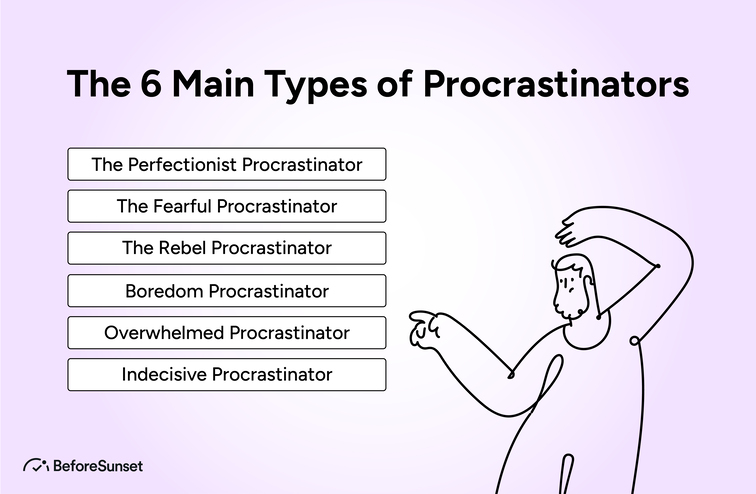
The 6 Main Types of Procrastinators
The act of delaying or postponing work or responsibilities is referred to as procrastination. It is characterized by a proclivity to put off essential chores or decisions, frequently in favor of less important or less urgent activities.
Procrastination can reduce productivity, stress levels, and overall well-being. It is a widespread issue that affects people of all ages and backgrounds, and it can be caused by a number of factors such as perfectionism, fear of failure, a lack of desire, or poor time management skills.
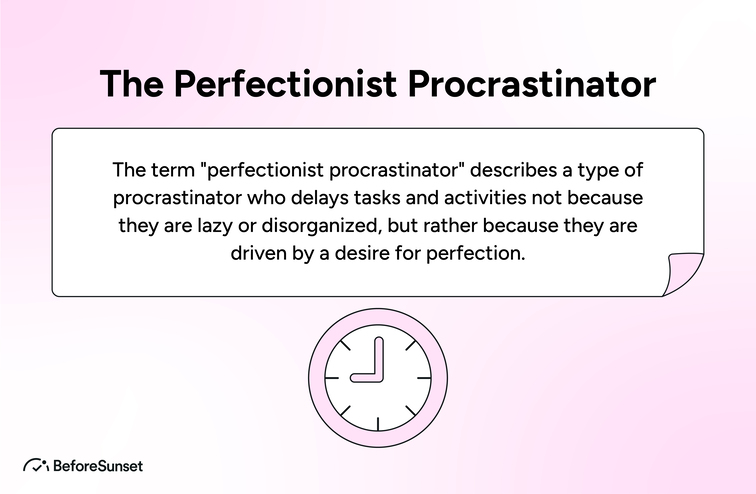
The Perfectionist Procrastinator
The "Perfectionist Procrastinator" is a sort of procrastinator who holds themselves to extremely high standards and becomes overwhelmed by the pressure to execute flawlessly. They frequently postpone starting work because they do not believe they can match their own standards.
This sort of procrastinator may be afraid of failure and is more likely to put off things that they believe to be high-stakes or critical. They may also be more prone to "all-or-nothing" thinking, which holds that work must be accomplished flawlessly or not at all.
Perfectionist procrastinators are extremely self-critical and may have difficulties recognizing even little mistakes, leading to a lack of confidence in their talents, which fuels their procrastination even more.
Procrastination among perfectionists may also be motivated by a desire to avoid unwanted feedback or criticism. They may put off completing a task until the last minute to avoid others noticing their mistakes or flaws.
To overcome this sort of procrastination, you may need to address perfectionistic thinking, learn to accept mistakes, improve your time management skills, and create realistic goals.
The Fearful Procrastinator
The "Fearful Procrastinator" is a procrastinator who is terrified of failing, being rejected, or succeeding. They may postpone starting a task because they are concerned they will not be able to accomplish it satisfactorily, or they may be afraid of the repercussions of success.
This sort of procrastinator may be afraid of being judged or assessed, and they are more inclined to postpone high-stakes or publicly exposed jobs. They may also be more likely to procrastinate on essential but non-urgent jobs because they are confused about how to begin or are fearful of failing to accomplish the activity to their satisfaction.
Fearful procrastinators may also overthink and overanalyze projects, leaving them feeling overwhelmed and unsure of how to proceed. They may also skip or ignore tasks to avoid the chance of failure or rejection.
To overcome this sort of procrastination, the individual may benefit from confronting their anxieties and developing self-confidence, as well as learning to break down the activity into smaller portions, set realistic goals, and develop a plan of action. Seeking help from a therapist can also be beneficial, as they can help the client recognize and address the underlying fears that are driving their procrastination.

The Rebel Procrastinator
A "Rebel Procrastinator" is a type of procrastinator that defies rules and authority. They may put off starting a task because they do not want to be told what to do or because they do not see the benefit of finishing it. This sort of procrastinator may have a strong sense of independence and is more inclined to postpone activities they believe to be imposed on them by others.
Rebel procrastinators are also more inclined to put off jobs that they consider dull, uninteresting, or pointless. They may also be dubious and question the importance or relevance of the activity at hand, causing them to put it off.
This form of procrastination may also be motivated by a lack of personal involvement in the work. To be motivated to complete a task, rebel procrastinators may need to find a method to relate it to their own personal values or interests.
To combat this sort of procrastination, the individual may benefit from identifying the underlying causes of their resistance to the activity, such as feeling controlled or thinking the task is meaningless.
Once the cause has been discovered, the individual can focus on resolving the issues, such as finding a means to make the assignment more interesting or relevant or conversing with the person who assigned the task to understand their point of view and reasons.
Boredom Procrastinator
That person is the "Boredom Procrastinator," who puts off completing chores because they dislike them. If a person is a chronic procrastinator, they will most likely struggle to focus on things that they find uninteresting or monotonous. Have any of us not felt that way at some point? They may also be easily sidetracked and put off chores they consider unimportant or unneeded.
Bored people frequently look for new hobbies to perform in addition to finding other ways to fill their time. A person may find it difficult to begin a work that they find boring or uninteresting.
Is there a method to avoid such delaying tactics? There is no guarantee that we will always have something enjoyable to do. We all have to do mundane tasks from time to time. To improve engagement and interest, this person may find it useful to establish personal challenges, tie the activity to their own values or interests, or divide the task into smaller, more manageable sections.
A reward system for finishing the task or improving concentration and focus can also be extremely motivating.
The individual may also be able to recognize and resolve underlying causes of boredom, such as a lack of challenge or interest in the activity at hand.
Understanding the basis of one's procrastination might assist one end it, whether the procrastinator is under control or merely perceives the action as pointless. After determining the source of the problem, the individual can focus on resolving it.
They might find a way to make the task more entertaining or relevant, or they might question about the motivations and opinions of the person assigning the work.

Overwhelmed Procrastinator
An "Overwhelmed Procrastinator" is someone who procrastinates because they have too much on their plate. This procrastinator may struggle with time management and task prioritization, leaving them overwhelmed and unclear of what to do next. They may also be prone to multitasking, which leaves them feeling overwhelmed and unable to complete tasks.
Procrastinators who suffer from anxiety tend to overthink and overanalyze events, leaving them feeling overwhelmed and unsure of what to do next. They may also avoid doing things altogether if they believe they will fail or be rejected if they try.
Individuals who battle with this type of procrastination can learn to overcome it by dividing major jobs into smaller, more manageable portions, establishing feasible priorities, and establishing attainable goals. Making a timetable or a to-do list, for example, might be useful for keeping track of tasks and due dates.
Overwhelming feelings may be relieved by addressing the underlying issues that are creating them. A therapist can assist the patient in identifying and addressing these deeper concerns.
Indecisive Procrastinator
The "Indecisive Procrastinator" is a sort of procrastinator that has difficulty making decisions and developing a plan of action, causing them to postpone chores. Does this sound familiar? This sort of procrastinator may struggle to choose between possibilities and is more likely to put off chores that require decision-making. They may also have a proclivity to overanalyze tasks, leading to feelings of uncertainty about how to proceed.
Indecisive procrastinators may also postpone or ignore work in order to avoid the prospect of failure or rejection. They may also struggle to identify priorities and are more likely to postpone on critical but non-urgent chores.
To address this sort of procrastination, the individual may benefit from developing decision-making skills, such as learning to consider the pros and cons of various options, defining priorities, and developing a plan of action. It may also be beneficial to learn to understand that not every option will be flawless and that making mistakes is OK.
Addressing any underlying concerns that may be contributing to the indecision, such as fear of failure, lack of self-confidence, or lack of desire, may also be beneficial. A therapist can also assist the individual in identifying and dealing with these underlying difficulties.
The Opposite of Procrastination In One Word?
Rather than postponing doing your work until the last minute, there is an option of doing it early. Not just early, doing it with a rush of urgency disregarding the quality of work. This is called precrastination and it may not be as healthy as you think. Procrastination increases stress because of the little time period you have left to finish the work.
Precrastination creates the stress of doing it as soon as you can. In this stressful state of mind, you start doing errors and your work might not live up to your standards. The best way to work is the happy middle, don't do it the last minute, take your time to bring out a work you can be proud of.
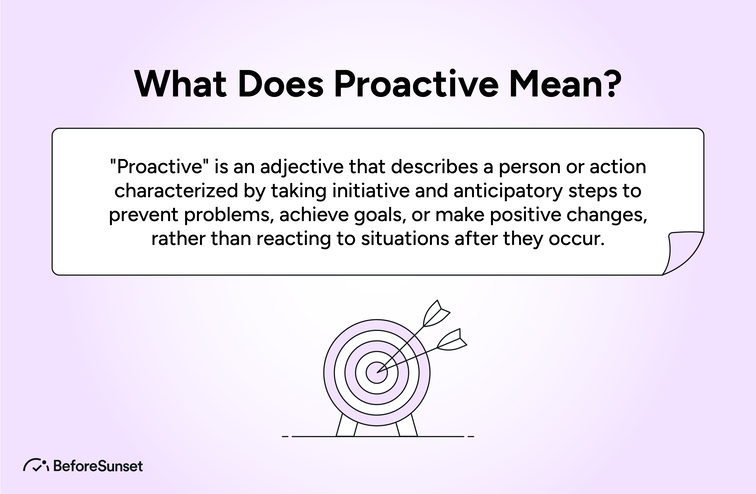
What do you call a person who always finishes their tasks once they receive them?
People will regard you as a responsible, dependable, and diligent worker if you always complete your assignments as soon as you receive them. It sounds like a dream, isn't it? This person's attributes are sometimes referred to as task-oriented, goal-driven, or self-disciplined.
They can prioritize their work, plan their schedules, and stay focused on the task at hand, all of which contribute to projects being completed on time. People who are "proactive" are those who do not sit about waiting for things to happen but instead actively pursue them.
What is wrong with getting things done quickly and checked off the list?
There is nothing inherently wrong with completing tasks quickly and marking them off a list. In fact, it can be a positive quality because it demonstrates that the person is responsible, dependable, and efficient in finishing their work. However, depending on the situation, there may be a few drawbacks to always trying to get things done quickly and checked off the list.
One disadvantage of focusing on speed and efficiency is that it may lead to sacrificing quality for quantity. When a person is continuously rushing to complete chores, they may not take the time to thoroughly verify their work and may make mistakes. This can result in inferior work that will take more time and effort to remedy later.
Another disadvantage of focusing on speed and efficiency is that it might lead to burnout. When a person is constantly pushing themselves to do activities fast, they may neglect to relax and recharge, resulting in feelings of tiredness and stress.
Furthermore, getting things done quickly and crossing them off a list can lead to ignoring other vital elements of life such as relationships, hobbies, and self-care.
Overall, it's critical to establish a balance between performing things efficiently and swiftly, as well as taking the time to ensure that the work is of high quality and resting and recharging.

What is The Opposite of Self Motivation?
The opposite of self-motivation is often described as a lack of motivation or demotivation. This can manifest as a lack of interest, enthusiasm, or drive to pursue goals or engage in activities. Some common causes of demotivation include feeling overwhelmed, bored, or disengaged, lacking confidence in one's abilities, or experiencing negative feedback or setbacks.
In some cases, external factors such as a toxic work environment or unsupportive relationships can contribute to demotivation. Additionally, mental health issues such as depression or anxiety can also lead to a lack of motivation.
It's important to note that demotivation is not the same as laziness or apathy, which implies a deliberate choice to avoid effort or responsibility. Demotivation is often a temporary state that can be overcome with strategies such as goal-setting, self-care, seeking support, or reframing negative thoughts.
Understanding and Overcoming Procrastination
Procrastination is kind of inevitable for everyone and in every aspect of life. Even though you promise yourself to never delay the tasks again, you inevitably do at the end of the day. Rather than making it a problem, you should embrace it and use it as a strategy to handle the tasks like a pro.
Working under pressure might help you to work more effectively, even at the last minute. I know it sounds ironic, but you can see the positive sides of the problem, and you can adapt them to the new situation that you create. By embracing your problem and using it as a tool for your own benefit, you can help enemies turn into lovers. Timing and prioritizing are everything throughout this process, accordingly, tracking time is crucial.
What Is An Alternative For Procrastinate?
Setting priorities is a good substitute for procrastinating. When you give a job or objective a higher priority, you choose to concentrate on it right now rather than putting it off or avoiding it. Setting priorities entails establishing specific objectives, making a well-organized to-do list, and effectively managing your time and resources to focus on the most crucial things first.
This strategy promotes productivity, time management, and a proactive mentality, enabling you to utilize your time more efficiently and achieve your goals. Prioritizing gives you the ability to go forward and take on your tasks with a sense of purpose and dedication rather than procrastinating.
What Is A Word For Someone Who Doesn't Procrastinate?
A "diligent" individual is someone who doesn't put things off. The attribute of being devoted, diligent, and timely in performing activities and obligations is referred to as diligence. When it comes to effectively managing their time and obligations, diligent people are renowned for never giving in to the habit of postponing or avoiding difficult tasks.
They approach their work with a strong sense of responsibility and work ethic, making sure they do their assignments on schedule. They frequently achieve great levels of productivity and success in both their personal and professional undertakings thanks to their structured and proactive attitude.
Stop Procrastinating Start Doing With BeforeSunset AI
With BeforeSunset AI, you can easily track your time and worry less about the projects, because you will complete each task smoothly before sunset.






.png)
.png)
.png)
.png)
